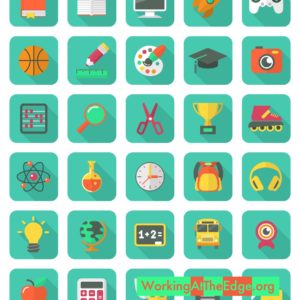 You’ve probably heard something to the effect that “learning how to learn” is a critical skill everyone needs as we move deeper into this century of exponential change. If learners, young and old, know themselves and how to learn, they will be able to innovate, overcome challenges, and move themselves and society toward a future of limitless possibilities. In fact, in Education Reimagined‘s Practitioner’s Lexicon: What is meant by key terminology? we see the learner-centered paradigm valuing “learning how to learn”:
You’ve probably heard something to the effect that “learning how to learn” is a critical skill everyone needs as we move deeper into this century of exponential change. If learners, young and old, know themselves and how to learn, they will be able to innovate, overcome challenges, and move themselves and society toward a future of limitless possibilities. In fact, in Education Reimagined‘s Practitioner’s Lexicon: What is meant by key terminology? we see the learner-centered paradigm valuing “learning how to learn”:
In this paradigm [the learner-centered paradigm], the most critical form of learning is learning how to learn. (pg. 4)
The concept of knowing how to learn intersects with two texts I’ve read most recently: Ray Dalio‘s Principles: Life and Work, and a research paper from several famous psychologists including Carol Dweck, et al. titled Implicit Theories of Interest: Finding Your Passion or Developing It?
In the introduction to Dalio’s book, he shares his first principle:
Think for yourself to decide 1) what you want, 2) what is true, and 3) what you should do to achieve #1 in light of #2. (pg. xi)
Looking at this through the learner-centered lens, you can see how this sage advice is very personal, relevant and contextualized. At the root of the principal is authenticity. Since we are all “wondrous, curious individuals with vast capabilities and limitless potential” (pg. 1) as distinguished in the learner-centered paradigm, we must each own – exercise our agency to own – our thoughts and actions. It’s not what our teachers want us to think or do. Or our parents, our supervisor or co-workers. It’s what each of us as individuals wants to think and do. Dalio shares (p. xii) “The worst thing you can be is a phony, because if you’re a phony you will lose people’s trust and your own self-respect. So you must be clear about your principles and then you must ‘walk the talk.'” How are we helping young learners be authentic so it’s what they want and nobody else?
This “thinking for yourself” about our principles is not fixed as we learn in the Implicit Theories of Interest article. In learner-centered education we often talk about recognizing individual learner passions and interests. In the article we learn that our unique passions and interests are not something already inside of us waiting to be discovered (the fixed theory of interests), but rather they are cultivated over time (the growth theory of interests) and shaped by our experiences.
There’s an important lesson here for educators. As we want learners to activate agency and define what they want and what they need to do to get what they want in a manner that is authentic to them, we must help them also understand that “passion” and “interest” develop over time and require learning. We need to create an environment where it’s alright to not “like” something in an initial encounter. Passions and interests develop over the course of a lifetime as a result of investment (time and effort) and development – of learning. In our fast-paced, 280 character, “too long-didn’t read it” world, how do we help learners slow down and give experiences the necessary time to potentially develop into a passion or interest – to give them opportunities to learn how to learn about growing passions and interests?
A personal example: for most of my lifetime, music has been a passion. It still is, but along the way, it has been overshadowed by a passion for education in general, leadership and learner-centered education more specifically. And who knows how my passions and interests will develop over the next decade. Through curiosity, investment and development, “what I want” has changed over time. And it will likely continue to develop.
The most critical form of learning is learning how to learn. Part of that is a growth mindset willing to engage with ideas and activities that may not initially seem like passions or interests, but over the course of time develop into such. Only then will we, and our young learners, be our authentic selves in pursuit of “what we want.”
How are we providing young learners with the space to pursue what they want while realizing that passions and interests are developed through investment and development over the age span?
Connect with Randy on Twitter, the TLTalkRadio podcast, and the Shift Your Paradigm podcast!
Get new content delivered to your inbox and the ebook 3 Key Principles of Digital Transformation. The ebook contains valuable information from my experience leading a digital transformation and working with a variety of stakeholders over the past decade.
- A silver lining - January 22, 2022
- Is our use of tech working against us? 🤔 - September 8, 2021
- What’s NOT going to change in the next 10 years? 🤔 - September 7, 2021